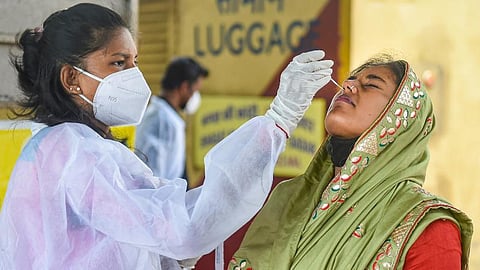

NEW DELHI: India is witnessing a slight rise in COVID-19 cases, with states such as Kerala, Maharashtra and Delhi reporting the highest numbers, according to government data. As of May 26, India has 1,009 active cases, with over 700 reported in the last week alone.
In the past week, seven people have died from the virus, which has resurged after a prolonged quiet period. Until May 19, the country had recorded only one COVID-19 death.
However, Dr Rajiv Behl, Director General of the Indian Council of Medical Research (ICMR), said there was no cause for concern. "As of now, the severity is generally low. There's nothing to worry about. We should be vigilant and we should always be prepared," the ICMR DG asserted.
Dr Behl noted an increase in cases—initially in the south, then the west, and now northern India. All cases are being monitored through the Integrated Disease Surveillance Programme (IDSP), he added.
“People do not need to take any immediate action. They should follow normal precautions. There is nothing special to do right now,” he said.
When asked about the need for booster doses, he said there was no current requirement for vaccination. “India has the capability to make vaccines and if needed, we can produce any vaccine quickly.”
The rise in COVID-19 cases in India coincides with a sharp spike in cases in several Southeast Asian countries, especially Hong Kong, Singapore, China and Thailand.
According to the Indian SARS-CoV-2 Genomics Consortium (INSACOG), India has detected one case of the emerging variant NB.1.8.1 and four cases of the LF.7 type. One NB.1.8.1 case was identified in April in Tamil Nadu, while four LF.7 cases were found in Gujarat in May.
Speaking about the new variants, Dr Behl said genome sequencing of samples from western and southern India shows these new variants are not severe and belong to Omicron sub-lineages including LF.7, XFG, JN.1 and NB.1.8.1. The first three variants are more prevalent, he added.
“Samples from other regions are being sequenced and we will know within a day or two if there are more variants.”
Of the more than 1,000 active cases, Kerala reported 430 cases during the week of May 19-26, compared to 95 cases till May 19. The southern state also reported two deaths.
Maharashtra reported 209 active cases and four deaths, a sharp rise from 56 cases as of May 19.
Delhi has also seen an increase in cases.
The capital recorded 105 active cases, compared to just five on May 19, according to Krishna Prasad, a health data analyst based in Kerala. “Delhi has reported a sharp rise in cases within a week. From May 19-26, Delhi reported 99 active cases. Till May 19, there were only five cases,” he said.
Karnataka is also experiencing a rise in cases, with 47 active cases as of May 26, up from 13 till May 19. One death was reported.
Other states reporting COVID-19 cases include Gujarat (83 compared to seven till May 19), Uttar Pradesh (15 compared to zero), West Bengal (12 compared to one), and Tamil Nadu (69 compared to 66).
The ICMR DG said that when cases increase, three factors are considered. “It depends on how transmissible the virus is—how quickly cases rise. Previously, we saw cases double in two days, but currently, the rise is slower.
“Secondly, we assess whether new variants are evading prior immunity—whether natural or vaccine-induced. But there’s nothing to worry about at the moment,” Dr Behl said.
He added that the third factor is the percentage of severe cases among all COVID instances.
While 93 cases were reported during the week of May 5-12, this number rose to 164 during May 13-19.